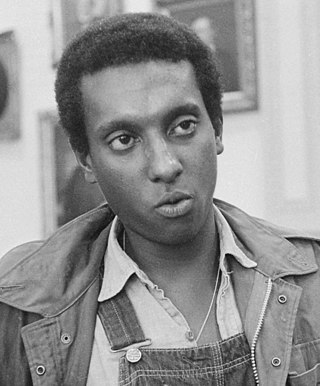
Conakry is the capital and largest city of Guinea. A port city, it serves as the economic, financial and cultural centre of Guinea. Its population as of the 2014 Guinea census was 1,660,973.

Kwame Ture was an American activist who played a major role in the civil rights movement in the United States and the global pan-African movement. Born in Trinidad in the Caribbean, he grew up in the United States from the age of 11 and became an activist while attending the Bronx High School of Science. He was a key leader in the development of the Black Power movement, first while leading the Student Nonviolent Coordinating Committee (SNCC), then as the "Honorary Prime Minister" of the Black Panther Party, and last as a leader of the All-African People's Revolutionary Party (A-APRP).

Ahmed Sékou Touré was a Guinean political leader and African statesman who was the first president of Guinea from 1958 until his death in 1984. Touré was among the primary Guinean nationalists involved in gaining independence of the country from France. He would later die in the United States in 1984.

Whitney Moore Young Jr. was an American civil rights leader. Trained as a social worker, he spent most of his career working to end employment discrimination in the United States and turning the National Urban League from a relatively passive civil rights organization into one that aggressively worked for equitable access to socioeconomic opportunity for the historically disenfranchised. Young was influential in the United States federal government's War on Poverty in the 1960s.

Boubacar Diallo Telli was a Guinean diplomat and politician. He helped found the Organisation of African Unity (OAU) and was the second secretary-general of the OAU between 1964 and 1972. After serving as Minister of Justice in Guinea for four years he was executed by starvation by the regime of Ahmed Sékou Touré at Camp Boiro in 1977.
Brigadier John Amadu Bangura, CBE was a Sierra Leonean who served as Chief of the Defence Staff of the Sierra Leone Armed Forces from 1968 to 1971. Prior to this in 1967, he served as the Sierra Leonean Ambassador of to the United States.
Chérif Souleymane, also known as Chérif Soulegmane, is a Guinean former footballer who played as a midfielder. He is considered among the finest footballers Guinea has ever produced. He was named the France Football African Footballer of the Year and the African Footballer of the Year in 1972 while playing with Hafia FC in Conakry.
Operation Green Sea was an amphibious attack on Conakry, the capital of Guinea, by between 350 and 420 Portuguese soldiers and Portuguese-led Guinean fighters in November 1970. The goals of the operation included the overthrow of Ahmed Sékou Touré's government, capture of the leader of the African Party for the Independence of Guinea and Cape Verde (PAIGC), Amílcar Cabral, destruction of the naval and air assets of the PAIGC and its Guinean supporters, and the rescue of Portuguese POWs held in Conakry.
Camp Boiro or Camp Mamadou Boiro (1960–1984) is a defunct Guinean concentration camp in the city of Conakry. During the regime of President Ahmed Sékou Touré, thousands of political opponents were imprisoned at the camp. It has been estimated that almost 5,000 people were executed or died from torture or starvation at the camp. According to other estimates, the number of victims was ten times higher: 50,000.
Ibrahima Barry, popularly known as Barry III, was a Guinean politician. He was the leader of the political party Socialist Democracy of Guinea (DSG).

Fodéba Keïta was a Guinean dancer, musician, writer, playwright, composer and politician. Founder of the first professional African theatrical troupe, Theatre Africain, he also arranged Liberté, the national anthem of Guinea.
Moussa Diakité was a Guinean politician during the presidency of Ahmed Sékou Touré. He was a member of the national Politburo. His wife, Tata Keïta, was half sister of the President's wife Andrée, and his son married the eldest daughter of Ismael Touré, the president's brother.
Karim Bangoura was a Guinean diplomat.

Abdoulaye Touré was a politician in the first Guinean republic. He was arrested after a coup in April 1984, and was executed in July 1985.
Alioune Dramé was a Guinean economist and politician. He also served as an ambassador to Ivory Coast.

Human rights in Guinea, a nation of approximately 10,069,000 people in West Africa, are a contentious issue. In its 2012 Freedom in the World report, Freedom House named Guinea "partly free" for the second year in a row, an improvement over its former status as one of the least free countries in Africa.
The following is a timeline of the history of the city of Conakry, Guinea.

Jeanne Martin Cissé was a Guinean teacher and nationalist politician who served as ambassador to the United Nations and in 1972 was the first woman to serve as President of the United Nations Security Council. She served in the government of Guinea as Minister of Social Affairs from 1976 until the 1984 military coup.

The 1984 Guinean coup d'état was the bloodless military coup that took place in Guinea on 3 April 1984, led by Colonel Lansana Conté. It led to the deposition of Prime Minister Louis Lansana Beavogui, who had held the office since 1972, and had been serving as interim president since 26 March, when longtime President Ahmed Sékou Touré died during an emergency heart operation at the Cleveland Clinic in the United States.










